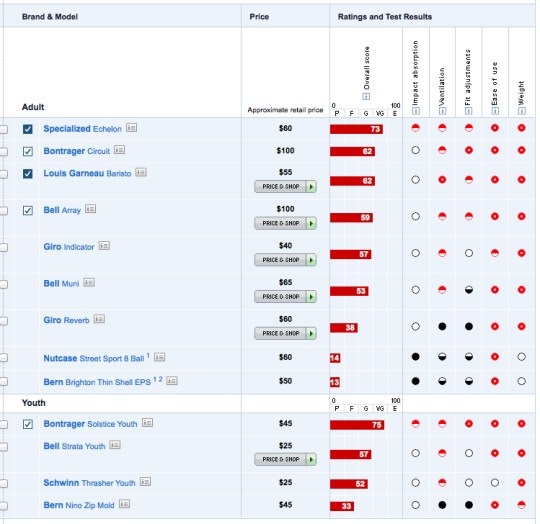

Two helmets that are very popular on the streets of Portland have been given low scores — including a “poor” rating in impact absorption — in a recent test published by Consumer Reports.
The Street Sport 8 Ball from Portland-based Nutcase and the Brighton Thin Shell EPS from Bern came in well behind the seven other adult helmets in the test. The Nutcase model received a total score of 14 out of 100, while the Bern got a 13. These two helmets were the only ones in the test (which also looked at four youth helmets) to receive a “poor” rating in the “impact absorption” category. The Echelon model by Specialized finished on top with 73 points.
To test the helmets, Consumer Reports used, “an apparatus that drops them at about 11 or 14 mph onto differently shaped anvils.” A tester told ABC TV that, “The impact test simulates what happens when a helmet impacts different surfaces, like a flat surface like a street, a rounded triangle like a curb, and a hemispherical surface, which simulates hitting a rock.” According to their website (which is behind a paywall that I paid to get over to write this article), they also used an electronic sensor inside a dummy metal head to detect, “how much force would be transmitted to a rider’s head in an accident.”
Here’s more about their test:
“All but two models absorbed the force of impact within the limit set by the current Consumer Product Safety Commission (CPSC) standard. The two… slightly exceeded that limit in at least two out of three drops. We have judged them Poor for impact absorption in our Ratings.”
And here are all the rankings:

Nutcase is based in southeast Portland and it’s hard to go anywhere around here without seeing one of them. We asked the company for a response to these rankings. They said the review is “concerning” and that they are “proactively evaluating” the results. To learn more, Nutcase has requested a full report of the test protocols used by Consumer Reports.
“Because we cannot verify that Consumer Reports internal lab is CPSC certified, we also cannot verify nor discount the methodologies used in the Consumer Reports testing.”
Nutcase statement
“Because we cannot verify that Consumer Reports internal lab is CPSC certified,” the statement says, “we also cannot verify nor discount the methodologies used in the Consumer Reports testing.”
Nutcase says they put their helmets through “rigorous safety checks” at various steps in the manufacturing process to ensure they meet CPSC standards (including tests by an independent, third party).
Nutcase also came under fire back in July after the Danish Consumer Council gave one of their helmets a failing grade and said, “Nutcase is putting cyclists’ safety on the line when they choose to keep their helmets on the market.” That statement was picked up by popular (and very anti-helmet) blog Copenhagenize and it caused quite a stir in Denmark. Michael Morrow, Nutcase’s founder, said at the time that he was very surprised at those findings. When he asked repeatedly to see the lab reports from the Danish Consumer Council in order to understand more about their results, Morrow says they ignored him.
This all adds up to bad publicity for Nutcase; and Morrow has reason to be concerned about these tests due to the potential impact on his valuable corporate brand. Without understanding materials science and being able to decipher the raw data and procedures behind the tests, it’s hard to fully understand why one helmet model performed poorly while others did well.
It’s also worth noting that the Nutcase and Bern are very different types of helmets than the others in the test. They are urban helmets with thick shells and relatively few vents. The top-rated Specialized, on the other hand, is more of a racing-style helmet with many vents. Was the same impact test used for both helmets? Perhaps the Specialized stands up well to high-impacts (like you’d experience in racing) and is less durable over time, while the Nutcase does better on less severe impacts (that you’re more likely to experience around town), but will last longer.
What do you think? Does this Consumer Reports test cause you concern?

